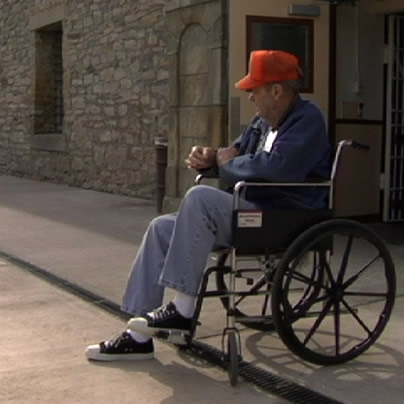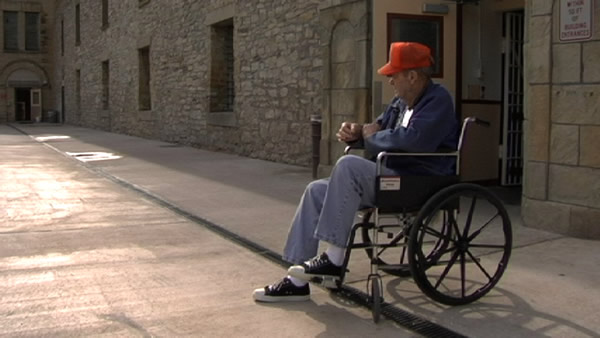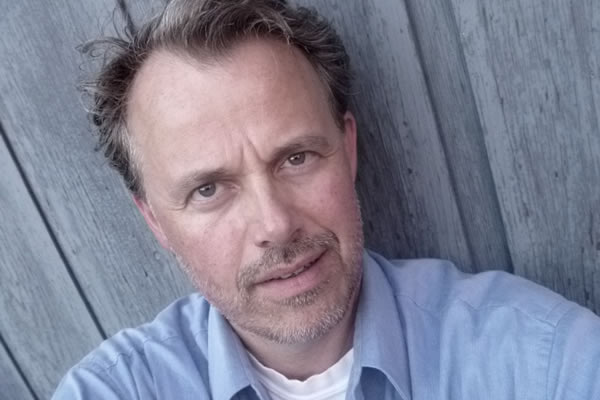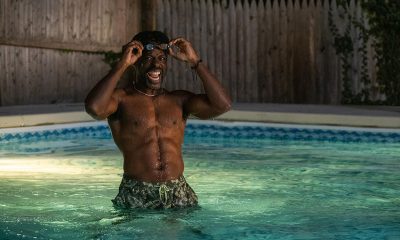Arts & Entertainment
This could be a game changer
‘Prison Terminal’ filmmaker was Oscar hopeful for end-of-life doc


George William Hall (Jack Hall), the subject of ‘Prison Terminal,’ which will screen later this month on HBO. (Photo courtesy HBO)
Editor’s note: This article was written before the Academy Awards. “The Lady in Number 6: Music Saved My Life” won in the Best Documentary Short Subject category.
With Hollywood’s elite ready to celebrate at the Academy Awards this Sunday, names like Cate Blanchett, Jared Leto and Jennifer Lawrence are predicted by many to take home Oscar gold.
One name up for an award who probably isn’t familiar to many is documentary director Edgar Barens, a gay filmmaker whose film “Prison Terminal: The Last Days of Private Jack Hall” is up for Best Short Documentary this year.
“I was just hit by a wall of emotion and started crying when I heard. I never sought the Oscar thing but when it happened, I was just overwhelmed,” Barens says. “This could be a game changer.”
Growing up in Chicago with European parents, Barens was exposed to the cinema at a very young age.
“I was always immersed in film. As a kid, my brother and I would go to film screenings and foreign films all the time,” he says. “By the time I got to college, I had no idea you could study film, and I was hooked when I saw the classes.”
Barens received his bachelor’s and master’s degrees in cinema and photography from Southern Illinois University, but found that it wasn’t the easiest thing to make a living as a filmmaker.
“My dad was an artist and always had projects he was working on and I got his work ethic. No matter what dead-end job I was working at, and I had many of them — such as a phlebotomist when making this film — I was always working on something on the side,” he says. “What I found was many of these temp jobs ended up blossoming into film jobs.”
Barens did company films, short documentaries and any project a company would need a camera and story for. The 53-year-old took most of his savings to invest in making his Oscar-nominated film and HBO came along with funds to finish the project.
“Prison Terminal: The Last Days of Private Jack Hall” follows the terminally ill Jack Hall, jailed in maximum-security prison at the Iowa State Penitentiary, as he faces his final days with the assistance of hospice care provided by workers drawn from the prison population.
“For me, I was giving a voice to the prisoners who don’t often get heard,” Barens says. “I was celebrating a program that was developed in their benefit to show people that even though they have done terrible things, at the end of the day, we have to be better than they were when they committed their crimes and show them dignity in their deaths.”
Barens spent six months shooting footage behind the walls of the Iowa State Penitentiary and has put together a poignant account of how the hospice experience can profoundly touch even the forsaken lives of the incarcerated.
It was a topic that wasn’t a new one for Barens, who had done a much smaller film about hospice care in a prison in Louisiana earlier in his career. That was just a two-week shoot about setting up a hospice in a prison, and he always hoped to take a much more elaborate look at the subject.
Going in, he didn’t know exactly what story he was going to tell, but fate turned the attention of the film to Hall, a decorated soldier who went to prison for 21 years for murdering a drug dealer.
“Two months into my stay, Jack started to get sick and it became a no-brainer that he was the guy I was going to follow,” he says. “It’s a hybrid cinema verite. I wanted to make it observational, but I needed information from people so the verite provides a buffer between the talking heads and the observational footage. People lose track that they are in a prison, but you get these little reminders, like when Jack is shackled.”

Gay documentary filmmaker Edgar Barens invested most of his savings to make ‘Prison Terminal: the Last Days of Private Jack Hall.’ (Photo courtesy of HBO)
Barens says he has plenty of footage about the workers, the hospice and the prisoners that didn’t make it into the finished film, and is working on a web-based media project that will let viewers learn more about what they see in the film.
The out filmmaker doesn’t think it’s necessary that his documentaries only deal with LGBT issues but neither does he shy away from the subject, even shooting a series of anti-homophobia public service announcements.
“Being gay is a big part of my life but I don’t think everything film-wise has to have a gay theme,” he says. “I would never shy away from it. I know some ideas of mine coming down the pike have a major gay theme, but not everything has to have that theme.”
A few days after learning of his award nomination, Barens flew to Sundance and learned from past nominees that regardless of whether he wins or not, his film career will probably be an easier ride.
“Just with the nomination they told me to expect not having to worry about how difficult it is to get funding for my next film, because people will recognize the nomination,” he says. “Not that people will throw money at me, but it should help greatly. I’m prepping myself for a big change, but you never know.”
Turning to Sunday, Barens will be dressing to the nines and bringing his mom as his date, and is looking forward to walking the red carpet with the star-studded guest list.
“I would like to wing it, but there are a few names I absolutely have to mention but there is a chance I may not even know who I am,” he says. “I’ll have a cheat sheet with some names and just let the rest come from my heart. That’s if I am lucky enough. It’s pretty nice to be nominated and I feel good for that accomplishment.”
“Prison Terminal: The Last Days of Private Jack Hall” will air on HBO at 8 p.m., March 31.

Team DC, the umbrella organization for LGBTQ-friendly sports teams and leagues in the D.C. area, held its annual Night of Champions Awards Gala on Saturday, April 20 at the Hilton National Mall. The organization gave out scholarships to area LGBTQ student athletes as well as awards to the Different Drummers, Kelly Laczko of Duplex Diner, Stacy Smith of the Edmund Burke School, Bryan Frank of Triout, JC Adams of DCG Basketball and the DC Gay Flag Football League.
(Washington Blade photos by Michael Key)




















The 2024 National Cannabis Festival was held at the Fields at RFK Stadium on April 19-20.
(Washington Blade photos by Michael Key)
















Covering the @NatlCannaFest at RFK Stadium for @WashBlade . Stop by the LGBTQ+ booth and pick up a paper if you are here. pic.twitter.com/is7hnsaPns
— Michael Patrick Key (@MichaelKeyWB) April 20, 2024
Theater
‘Amm(i)gone’ explores family, queerness, and faith
A ‘fully autobiographical’ work from out artist Adil Mansoor

‘Amm(i)gone’
Thorough May 12
Woolly Mammoth Theatre
641 D St., N.W.
$60-$70
Woollymammoth.net
“Fully and utterly autobiographical.” That’s how Adil Mansoor describes “Amm(i)gone,” his one-man work currently playing at Woolly Mammoth Theatre.
Both created and performed by out artist Mansoor, it’s his story about inviting his Pakistani mother to translate Sophocles’s Greek tragedy “Antigone” into Urdu. Throughout the journey, there’s an exploration of family, queerness, and faith,as well as references to teachings from the Quran, and audio conversations with his Muslim mother.
Mansoor, 38, grew up in the suburbs of Chicago and is now based in Pittsburgh where he’s a busy theater maker. He’s also the founding member of Pittsburgh’s Hatch Arts Collective and the former artistic director of Dreams of Hope, an LGBTQ youth arts organization.
WASHINGTON BLADE: What spurred you to create “Amm(i)gone”?
ADIL MANSOOR: I was reading a translation of “Antigone” a few years back and found myself emotionally overwhelmed. A Theban princess buries her brother knowing it will cost her, her own life. It’s about a person for whom all aspirations are in the afterlife. And what does that do to the living when all of your hopes and dreams have to be reserved for the afterlife?
I found grant funding to pay my mom to do the translation. I wanted to engage in learning. I wanted to share theater but especially this ancient tragedy. My mother appreciated the characters were struggling between loving one another and their beliefs.
BLADE: Are you more director than actor?
MANSOOR: I’m primarily a director with an MFA in directing from Carnegie Mellon. I wrote, directed, and performed in this show, and had been working on it for four years. I’ve done different versions including Zoom. Woolly’s is a new production with the same team who’ve been involved since the beginning.
I love solo performance. I’ve produced and now teach solo performance and believe in its power. And I definitely lean toward “performance” and I haven’t “acted” since I was in college. I feel good on stage. I was a tour guide and do a lot of public speaking. I enjoy the attention.
BLADE: Describe your mom.
MANSOOR: My mom is a wonderfully devout Muslim, single mother, social worker who discovered my queerness on Google. And she prays for me.
She and I are similar, the way we look at things, the way we laugh. But different too. And those are among the questions I ask in this show. Our relationship is both beautiful and complicated.
BLADE: So, you weren’t exactly hiding your sexuality?
MANSOOR: In my mid-20s, I took time to talk with friends about our being queer with relation to our careers. My sexuality is essential to the work. As the artistic director at Dreams of Hope, part of the work was to model what it means to be public. If I’m in a room with queer and trans teenagers, part of what I’m doing is modeling queer adulthood. The way they see me in the world is part of what I’m putting out there. And I want that to be expansive and full.
So much of my work involves fundraising and being a face in schools. Being out is about making safe space for queer young folks.
BLADE: Have you encountered much Islamophobia?
MANSOOR: When 9/11 happened, I was a sophomore in high school, so yes. I faced a lot then and now. I’ve been egged on the street in the last four months. I see it in the classroom. It shows up in all sorts of ways.
BLADE: What prompted you to lead your creative life in Pittsburgh?
MANSOOR: I’ve been here for 14 years. I breathe with ease in Pittsburgh. The hills and the valleys and the rust of the city do something to me. It’s beautiful, it’ affordable, and there is support for local artists. There’s a lot of opportunity.
Still, the plan was to move to New York in September of 2020 but that was cancelled. Then the pandemic showed me that I could live in Pittsburgh and still have a nationally viable career.
BLADE: What are you trying to achieve with “Amm(i)gone”?
MANSOOR: What I’m sharing in the show is so very specific but I hear people from other backgrounds say I totally see my mom in that. My partner is Catholic and we share so much in relation to this.
I hope the work is embracing the fullness of queerness and how means so many things. And I hope the show makes audiences want to call their parents or squeeze their partners.


















